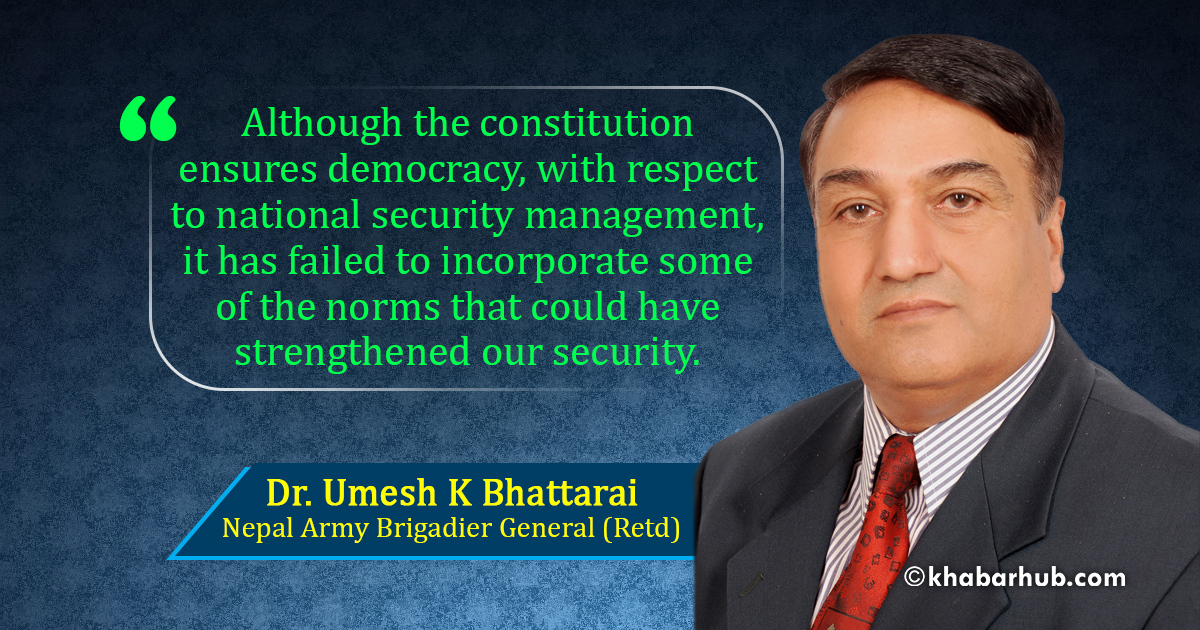Prime Minister KP Oli’s intention to unilaterally run the National Security Council (NSC) on his solo decision has warmed the politics of Nepal once again. Basically, it was the product of the 1990 constitution composed of prime minister as the chair, defense minister and the army chief as the members.
As there was the tradition of to hold the portfolio of the defense by the prime minister himself, in fact, the council had just two heads sharing 50/50 votes to mobilize the army.
The controversy arose when then PM Girija Prasad Koirala wanted to mobilize the army against the Maoist in 2001 in order to release 52 police personnel including, Deputy Inspector of Police (DSP), Thule Rai from the Maoist captivity in Holeri.
A brief explanation is pertinent to further explain the controversy. We must first understand the way the army was groomed under the monarchical system and the political vision of the leaders who had a limited exposure of statecraft and shortsightedness in the use of the military in terms of resolving internal conflict.
The most complex issue on national security of Nepal is to manage its geopolitical constraints. The coordination and control of national and international power centers are the most challenging for the governments of any nation. In fact, no power center wants to be controlled and intervened by the governments.
The palace wrangling into it was not clearly understood by the government and the actors of the geopolitics that dictate the national powers as well. The controversy between the government and the army was fabricated by media that compounded the entire episode forcing PM Koirala to resign from the post. The history is again repeating with PM Oli, due to his own wish to control the entire national apparatus, including the army.
In fact, the new Constitution of Nepal is inclusive in nature with decentralized power designated to provinces and the local governments. Although it ensures democracy, with respect to national security management it has failed to incorporate some of the norms that could have strengthened our security.
First of all, the Nepal Security Council (NSC) does not include the opposition party into it. It is important to understand that national security is not only the responsibility of either the government or the military alone. Basically, the council is composed of all the ministers who are not experts on security.
So, there should have been an advisory committee and the working groups of experts to advise the council. Constitutionally, there is no provision of National Security Adviser (NSA) to advise the council legitimately on military mobilization and to conduct research and analysis on national security lapses and finally to coordinate among the security agencies.
The most complex issue on national security of Nepal is to manage its geopolitical constraints. The coordination and control of national and international power centers are the most challenging for the governments of any nation. In fact, no power center wants to be controlled and intervened by the governments.
Unless the national government monitors and controls such agencies, the indigenous interests cannot be promoted, pursued and preserved against the overriding interests of foreigner powers.
In such a scenario, the autonomous body like NSC could have been provided with constitutional liberty to convince national security bodies as against the governments’ forced intervention on their jurisdiction. Nepal, situated between the two giants of Asia needs tactful diplomacy as a tool to promote own interest that can be wisely advised, coordinated, pursued and preserved under the able guidance of an adviser equipped with a robust team of a think tank like NSC. To make it vibrant, the political will power is must which is seriously lacking in Nepal.
Coming to the geopolitical dynamics again, the rising China and India are the centers of attention for the superpower, USA. China is the biggest rival for it as it is emerging faster. India, too, has a similar pace of development.
Let’s now examine the philosophy and the working style of the political elites, and the Nepal Army whose positive response is a must to make NSC vibrant. Elites have connections with powerful national and international personalities. By nature, every individual is selfish in terms of fulfilling his desires.
Binding to rules and regulations are mostly challenged by those who can break it. In a country like Nepal, this is very common. And mostly, the power centers are captured by such personalities who often exploit the commoners. So, they want the whole nation to move on an ad-hoc basis and oppose even the military to dominate the system. Basically, the Nepal Army was also influenced by like-minded people under the royal regime and then after. In fact, Nepal is a republic now but the mindset of such elites has remained the same.
Coming to the geopolitical dynamics again, the rising China and India are the centers of attention for the superpower, USA. China is the biggest rival for it as it is emerging faster. India, too, has a similar pace of development. So, the USA has an eye to use proxies against China which it had done in the decade of sixties from Nepal. If Nepal is not careful, it can be mired up into another conspiracy.
Notwithstanding all these, PM Oli wants to change the existing constitutional provision of NSC at one side to become more powerful individually rather than strengthening it as a robust institution. His imprudent move can be counterproductive and costly to the nation in the long run.
Views expressed in this article are the author’s own and do not necessarily reflect the stance of Khabarhub.









Comment